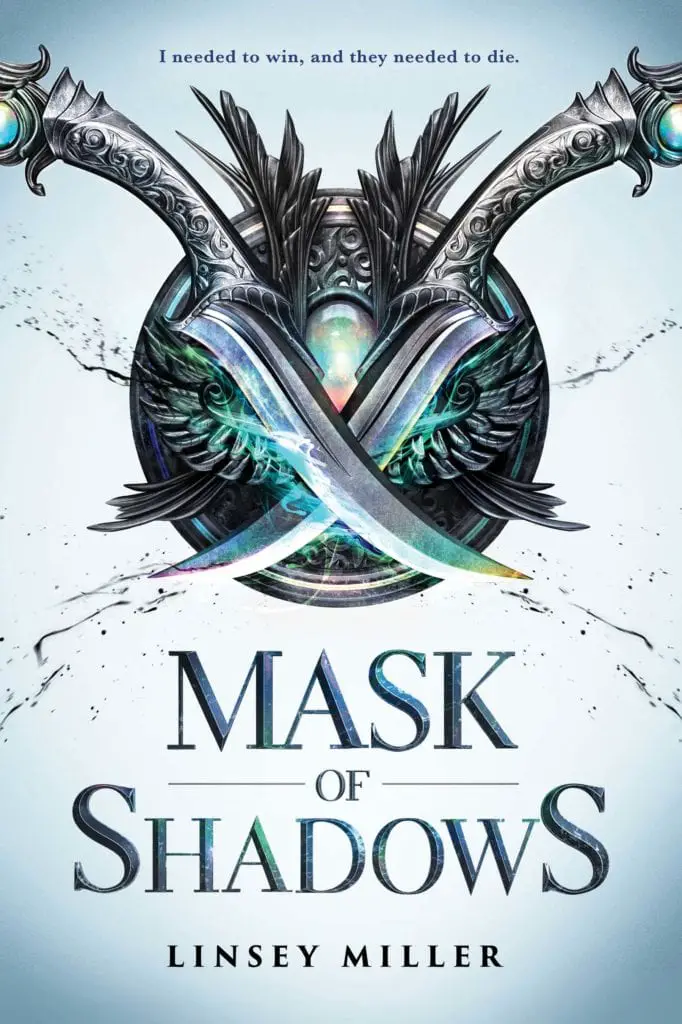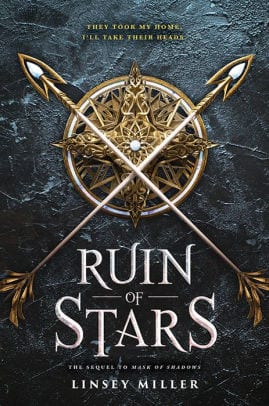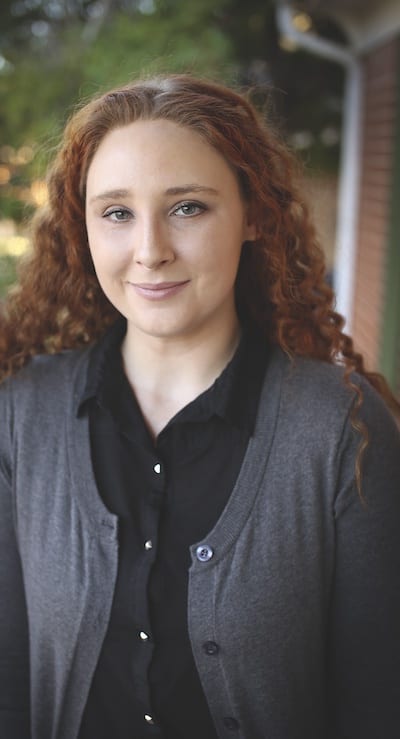Every now and again an opportunity falls into your lap to have a conversation with someone you never dreamed you’d get to. When Dan asked me if I might want to interview Linsey Miller, author of Mask of Shadows and its sequel Ruin of Stars, I fangirl screamed politely accepted the invitation to make contact. As a fan of queer YA, masked assassins, and page-turning action, I couldn’t pass up the possibility of talking with her. She said yes, and here we are.
So come join me as Linsey talks writing, representation, and what’s coming up next for her.
 Gretchen: Let’s start at the beginning, what got you into writing? Are you one of those life-long storytellers or did something specific inspire you to want to become a published author? Or both?
Gretchen: Let’s start at the beginning, what got you into writing? Are you one of those life-long storytellers or did something specific inspire you to want to become a published author? Or both?
Linsey Miller: I wrote a lot as a child. I was lucky—my parents liked reading and we had a library that wasn’t too far away. However, I didn’t really grow up thinking it was a thing that a person could do (even though my kid brain knew people did write books, the idea that I could didn’t really click). Years later, I ended up completely blowing my medical school applications and one of the interviewers said, “Sounds like you want to write books.” I started researching, reading, and writing more after that.
So thank you doctor who saw through my terrible application.
G: What makes books a compelling format for telling stories for YA audiences? Is there something you think books can do that say, a visual medium like film or television can’t?
LM: I think a lot of what makes them compelling will vary greatly from reader to reader (and they might never be as compelling as a film to some), but I know for me it was how immersive they were. With books, you have to directly interact with the prose in a way you can’t sometimes with visual mediums—the cadence and pacing of the reading, while it can be set by the narrative, is partly dependent on the reader. It’s easier to put yourself into the narrative and see yourself as a part of the story and world when you’re reading. I don’t think there’s something books can do that visual mediums can’t so much as that the interaction between reader and book is different than viewer and medium.
G: Speaking of your writing, what inspired you to write Mask of Shadows? What was it about the story itself or the characters that really drew you?
LM: There were a lot of small things. I like assassins, and I wanted to explore how difficult moral choices affect people, especially as a kid when you’re realizing that morality is not as solidly set as you thought. But at the same time, I really want to write a fantasy novel that let people be the rogue with a heart of gold and grapple with how difficult some parts of life are without sacrificing one for the other.
And then, there was this driving urge to explore a fantasy world that felt like it was a few years past when a book would normally be set so that I could see how the grown up heroes of a plot might cope with what happened and how that affects the young adults around them. Growing up after something huge happened and with the people who were directly involved was something I wanted to write about.
Also, I love Sal. Writing their story was a dream come true.
G: Your primary protagonist in the duology, Sal, is genderfluid; what led you in that direction and why do you think it’s important to have gender non-conforming characters in media for young adults?
LM: Before writing the book, there was a lot of talking about how Sal approached gender, navigated the world, and how the plot would and wouldn’t approach gender. I wouldn’t say anything led me in that direction specifically.
However, especially now that I know more, I think it’s important to have non-binary and gender non-conforming characters in media for young adults who are written by non-binary and gender non-conforming authors. People need to see themselves in media—especially young adults who are still figuring themselves and the world out—and they deserve to see themselves represented in all the nuanced ways that exists by people who know what it’s like.
So I go back and forth now on if it was my place to have written Sal, but I don’t want that to detract from how vitally important it is that kids see themselves in literature AND in the population creating that literature.
G: You also include a queer romance in the story and have multiple characters of color; why was it important to you to include so many layers of diverse representation?
LM: It was really important to me that the world was actually a world. I decided early on that if I wrote young adult that I had to take how and what I wrote very seriously, so the goal was to make sure that the world didn’t erase people or leave room to default characters to what is generally expected. I didn’t want the main characters to be token people. That felt unfair to them and to readers.
 G: Tell me more about your characters: What is your favorite thing (or things) about Sal? Is there anything that makes them especially challenging and/or exciting to write?
G: Tell me more about your characters: What is your favorite thing (or things) about Sal? Is there anything that makes them especially challenging and/or exciting to write?
LM: I love that Sal knows who they are. They’re confident and a little bit on the arrogant side, and they start Mask of Shadows knowing what they want. They do change over the course of the book, but I liked writing a character who knew themselves and didn’t feel guilty about it. Sal was just Sal. They enjoyed being Sal! That was exciting to write.
G: If you could write a book or short story highlighting one of your secondary characters, which one or ones would you choose and why?
LM: Ruby or Maud. Writing something for Ruby would give the added benefit of including a bunch of other characters, and I would love to explore the siege of the school ten years prior to Mask of Shadows. Nearly every character in the book would have been involved, and many would have been Sal’s age when it occurred.
As for Maud, she’s simply the best.
G: If you could give one piece of advice to other aspiring writers who want to write original fiction that you don’t think others are saying, what would it be?
LM: The advice to “write” is out there, but what happens emotionally during isn’t always talked about. Writing is a largely internal process—you spend a lot of time alone thinking about things that you can’t talk about. That loneliness can be draining, so make sure you take care of yourself if you can. Find out what helps you, find your people, and take care. A book is all well and good, but you’re important too.
G: What’s coming up next for you? Any other projects you’re working on that you can tell us or hint to us about?
LM: Yes! I have two new fantasy books coming out in 2020 and 2021. By Grace & Blood is a standalone young adult fantasy about two young women who must work together to stop a war waged by the powerful and greedy in a French-inspired fantasy world. I should have more information about it soon.
G: Anything else you want to share with us before we go?
LM: Save your work in multiples places as you go.
Don’t be me.
Whether you write by processor or by hand, make sure your work is copied and safe in at least 2 or 3 places.
G: That’s excellent advice. Thanks for chatting with me!
LM: You’re welcome!
About Linsey Miller

Originally from Arkansas, Linsey has previously worked as a crime lab intern, lab assistant, and pharmacy technician. She is currently an MFA candidate at Wichita State University and represented by Rachel Brooks of Bookends Literary. Her debut novel Mask of Shadows was the first in a young adult fantasy duology, which was completed with Ruin of Stars this year. Her next novel, a standalone French-inspired fantasy titled By Grace and Blood, will come out in 2020 with another standalone fantasy to follow in 2021. She can be found writing about science and magic anywhere there is coffee.
—
If you’d like to follow Linsey Miller to stay updated on current and future protects, check out her website and follow her on Twitter and Instagram.

